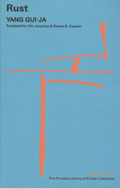
Rust
By Yang Gui-ja
(Jimoondang, 5,000 won)
What happens to your dreams when you know you can never reach them?
In answer, author Yang Gui-ja’s novella “Rust” presents a portrait of a middle class man who no longer wants to be what he wanted to be, and is deeply disillusioned by his old ideals and aspirations.
Yi, who used to dream of becoming a journalist, was rejected for his dream job as someone else with better connections in the field took it. Yet the newspaper company still took him in, for their advertising department instead of the newsroom. He was told he would be moved to his dream position as soon as there was another opening for reporters.
Now the father of a 5-year-old, Yi tries hard to support his family while maintaining his middle class lifestyle. He never became a reporter as he never received the offer they initially mentioned. And he does not want to be one, though he’s not necessarily happy with his current position as an advertisement dealer, either. Though he makes enough money to support his family, he is not respected by many in the company, as most of the reporters despise ad dealers and would not include them in their tight circle.
He one day insists buying a bike from a cheap brand for his 5-year-old. Having worked in the field, he knew how much money the bigger bicycle companies would ill-spend on advertising. Yet the cheap bike he bought for his son soon rusts, as well as many other objects in his typical middle class household.
The novel shows a portrait of an average human being, who, like many others, used to be young and aspiring. The rust in his household as well as the cheap bike represents and symbolizes many things, including Yi’s disillusionment, powerlessness and unwillingness to dream while only trying to maintain what he already has. This is a rich text that contains many ills of Korea’s modernized society, showing class barriers and elitism that limits one’s ability to fulfill goals and dreams.
Born in 1955 in Jeonju, North Jeolla Province, Yang studied Korean literature at Wonkwang University. While many of her works dealt with lives of ordinary citizens in the 1980s, Yang began writing relatively conventional and popular novels in the 1990s. She has won several prestigious literary awards, including Yi Sang Literary Award and Yoo Juhyeon Literature Award.
(dyc@heraldcorp.com)











![[Today’s K-pop] BTS pop-up event to come to Seoul](http://res.heraldm.com/phpwas/restmb_idxmake.php?idx=644&simg=/content/image/2024/04/17/20240417050734_0.jpg&u=)




![[KH Explains] Hyundai's full hybrid edge to pay off amid slow transition to pure EVs](http://res.heraldm.com/phpwas/restmb_idxmake.php?idx=652&simg=/content/image/2024/04/18/20240418050645_0.jpg&u=20240419100350)

![[Today’s K-pop] Zico drops snippet of collaboration with Jennie](http://res.heraldm.com/phpwas/restmb_idxmake.php?idx=642&simg=/content/image/2024/04/18/20240418050702_0.jpg&u=)